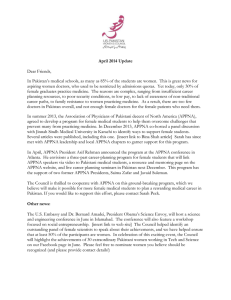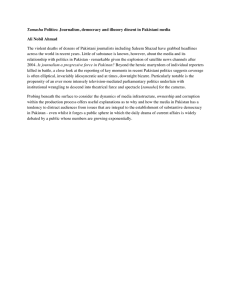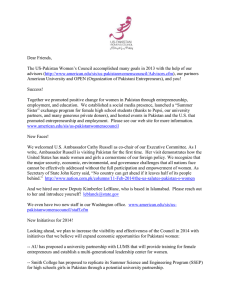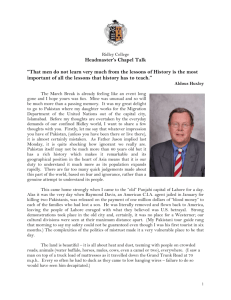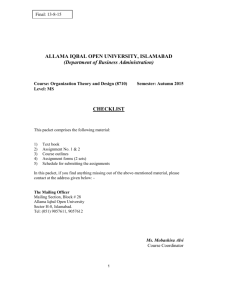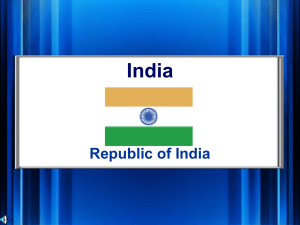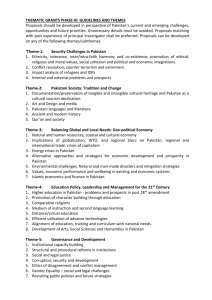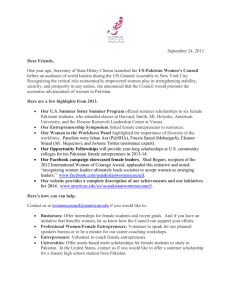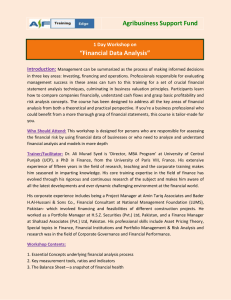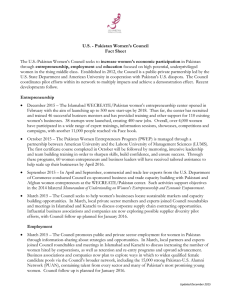Senator Joseph R. Biden, Jr. Opening Statement “India-Pakistan: Steps Toward Rapprochement”
advertisement
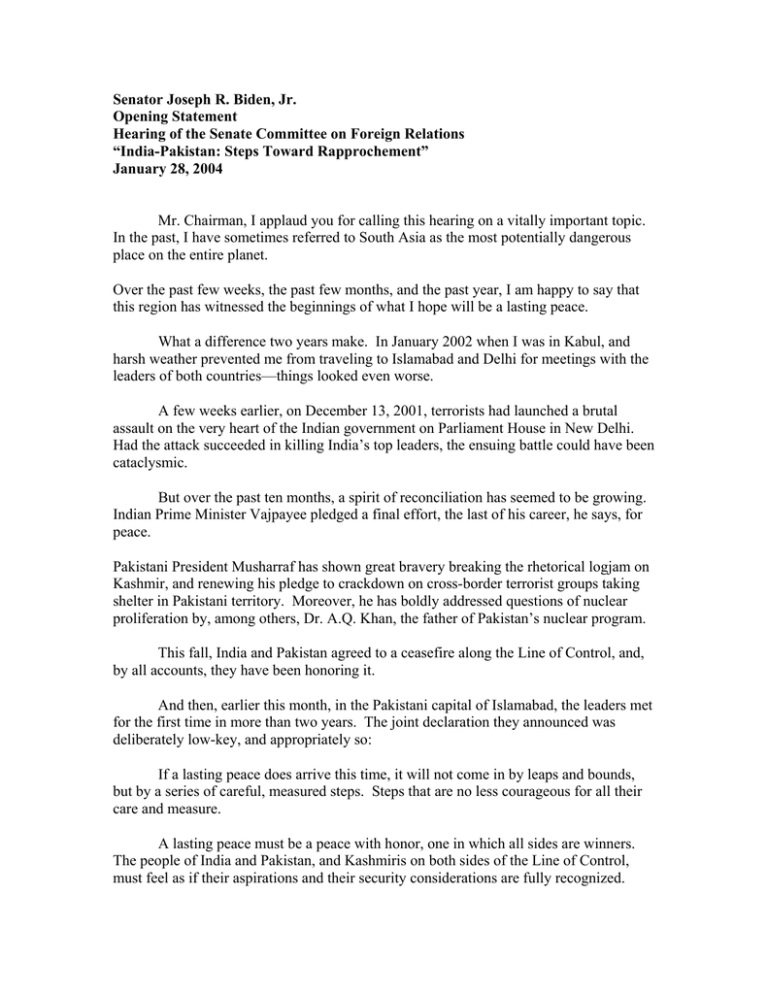
Senator Joseph R. Biden, Jr. Opening Statement Hearing of the Senate Committee on Foreign Relations “India-Pakistan: Steps Toward Rapprochement” January 28, 2004 Mr. Chairman, I applaud you for calling this hearing on a vitally important topic. In the past, I have sometimes referred to South Asia as the most potentially dangerous place on the entire planet. Over the past few weeks, the past few months, and the past year, I am happy to say that this region has witnessed the beginnings of what I hope will be a lasting peace. What a difference two years make. In January 2002 when I was in Kabul, and harsh weather prevented me from traveling to Islamabad and Delhi for meetings with the leaders of both countries—things looked even worse. A few weeks earlier, on December 13, 2001, terrorists had launched a brutal assault on the very heart of the Indian government on Parliament House in New Delhi. Had the attack succeeded in killing India’s top leaders, the ensuing battle could have been cataclysmic. But over the past ten months, a spirit of reconciliation has seemed to be growing. Indian Prime Minister Vajpayee pledged a final effort, the last of his career, he says, for peace. Pakistani President Musharraf has shown great bravery breaking the rhetorical logjam on Kashmir, and renewing his pledge to crackdown on cross-border terrorist groups taking shelter in Pakistani territory. Moreover, he has boldly addressed questions of nuclear proliferation by, among others, Dr. A.Q. Khan, the father of Pakistan’s nuclear program. This fall, India and Pakistan agreed to a ceasefire along the Line of Control, and, by all accounts, they have been honoring it. And then, earlier this month, in the Pakistani capital of Islamabad, the leaders met for the first time in more than two years. The joint declaration they announced was deliberately low-key, and appropriately so: If a lasting peace does arrive this time, it will not come in by leaps and bounds, but by a series of careful, measured steps. Steps that are no less courageous for all their care and measure. A lasting peace must be a peace with honor, one in which all sides are winners. The people of India and Pakistan, and Kashmiris on both sides of the Line of Control, must feel as if their aspirations and their security considerations are fully recognized. A lasting peace can be facilitated by the United States and other nations, but it cannot be imposed by any outside power. The only peace that will survive will be one forged and negotiated by the parties themselves. And we in the United States must indeed be prepared to facilitate such a peace. It is in our own national interest, and the interest of the world community. Even if the specter of nuclear weapons were not part of the equation, the threat of war in South Asia would be a prospect too dangerous to be ignored. What can we do to help? That depends what the parties themselves request. India and Pakistan have pledged to reopen bus service between the two main cities in divided Kashmir, and there are suggestions that this will be merely the first step towards more entry points and softer borders. Perhaps we can help with technical assistance, and the expertise we’ve gained from managing thousand-mile borders to our north and our south. President Bush has pledged a $3 billion aid package to Pakistan, to be spread over the coming five years. We in Congress will have to consider this proposal very carefully. Questions we’ll have to consider include: --Is this the right figure? --Should any conditions be attached? --Is the mix of aid proposed by the President—half for military aid, half for nonmilitary—the right ratio? This last question is, perhaps, the most important. A Task Force of the Council on Foreign Relations has proposed shifting the ratio from 1:1 to 1:2—that is, keeping the overall aid figure stable, but doubling the percentage of that goes for such things as schools and hospitals. This may well be a very constructive proposal. When President Musharraf was here in Washington in June, he highlighted secular education as Pakistan’s number one domestic requirement. We’ve all heard a lot about the role of madrassas, Islamic religious seminaries, as breeding grounds for the Taliban movement. Decades of neglect of Pakistan’s secular education system has left the madrassa system as the only way many families can send their kids to school. But the kind of education they get there leaves them utterly unprepared for jobs in modern society. And SOME of the madrassas are truly dangerous—training academies for the Taliban and Al Qaeda. The more we can do to bolster secular education in Pakistan, the safer we’ll all be. All of our witnesses today served on the Council Task Force, so this is one topic on which we can have a very fruitful discussion. Our witnesses are all experts in their fields: Ambassador Frank Wisner, former US Ambassador to India, is now a major figure in the blossoming business relationship between our two countries. Dr. Stephen Cohen, of the Brookings Institution, knows more about the Pakistani and Indian militaries than just about anybody who doesn’t have epaulettes on his shoulders. Michael Krepon, founding president of the Henry L. Stimson Center, has an unrivalled knowledge of nuclear confidence-building measures, as well as of such cutting-edge topics as space-based weaponry and missile defense. I welcome all of our witnesses, and I look forward to an informative and interesting hearing. # # #
